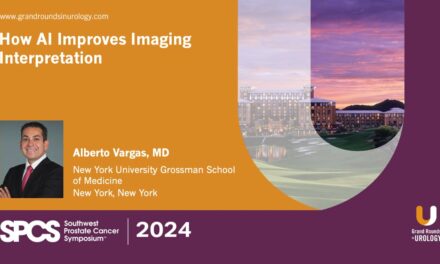Mukesh Harisinghani, MD, presented “Deep Learning Accelerated MRI of the Prostate for Increased Throughput and MRI-targeted Biopsy for Improved Prostate Tissue Sampling – Sponsored by Siemens Healthineers” during the 6th Global Summit on Precision Diagnosis and Treatment of Prostate Cancer on September 22, 2022.
How to cite: Harisinghani, Mukesh. “Deep Learning Accelerated MRI of the Prostate for Increased Throughput and MRI-targeted Biopsy for Improved Prostate Tissue Sampling – Sponsored by Siemens Healthineers.” September 22, 2022. Accessed Nov 2025. https://grandroundsinurology.com/deep-learning-accelerated-mri-of-the-prostate-for-increased-throughput-and-mri-targeted-biopsy-for-improved-prostate-tissue-sampling-sponsored-by-siemens-healthineers/
Deep Learning Accelerated MRI of the Prostate for Increased Throughput and MRI-targeted Biopsy for Improved Prostate Tissue Sampling – Sponsored by Siemens Healthineers – Summary
Mukesh Harisinghani, MD, Professor of Radiology at Harvard Medical School and Director of Abdominal MRI and of the Clinical Discovery Program at Massachusetts General Hospital, discusses how deep learning can accelerate MRI for prostate cancer detection without compromising scan quality. He provides background on the effectiveness of multiparametric (mp)MRI, identifies current shortfalls, and expands on the role of deep learning. He cites a UK quality audit that revealed 40% of patients did not have a sufficient scan. Dr. Harisinghani emphasizes that the right MRI technique is critical to ensuring a quality scan and effectively diagnosing clinically significant prostate cancer. He adds that mpMRI consistency across vendors is also a key factor. Dr. Harisinghani then discusses total mpMRI scan time, pointing out that the two main time sinks are T2-weighted imaging and diffusion-weighted imaging (DWI). Total scan time is also impacted by trying to balance image resolution and signal-to-noise ratio. Dr. Harisinghani describes how deep learning can address these issues and shows the resulting T2 tri-planar images. He concludes by outlining how a 15-minute exam, complete with deep learning mpMRI, can be achieved.
The Global Summit on Precision Diagnosis and Treatment of Prostate Cancer is a unique multi-disciplinary forum organized to inform the key health care stakeholders about the emerging advances in clinical case and research and create a consensus-based vision for the future of precision care and educational and research strategy for its realization. The mission of the Summit is to fill the currently existing gap between the key experts of in vivo imaging, the world authorities in the in vitro fluid- and tissue-based molecular diagnostics, including genomics, and thought leaders in the development of novel observation strategies (e.g., active surveillance, or AS) and therapeutic interventions.
ABOUT THE AUTHOR
Dr. Mukesh Harisinghani is a Professor of Radiology at Harvard Medical School, as well as Director of Abdominal MRI and of the Clinical Discovery Program at the Massachusetts General Hospital in Boston, Massachusetts. In addition, he is also the Section Editor for GU Radiology for theAmerican Journal of Roentgenology(AJR). He completed his residency and Clinical Fellowship in Abdominal Imaging & Intervention at Massachusetts General Hospital and has been on faculty in the Abdominal Section since 2001. Dr. Harisinghani’s research interests include MRI applications in body imaging, genitourinary radiology, and translational molecular imaging. His clinical expertise is in MR applications within the abdomen and pelvis. He has authored or coauthored over 150 scientific papers and has edited 5 books in these areas.





